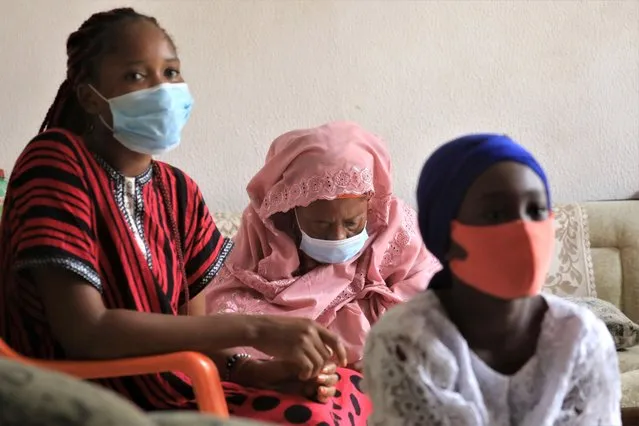
People wear protective face masks as they watch a television broadcast of the national tributes for Ivory Coast's late Prime Minister Amadou Gon Coulibaly, at a home in Treichville, Ivory Coast on July 14, 2020. (Photo by Thierry Gouegnon/Reuters)
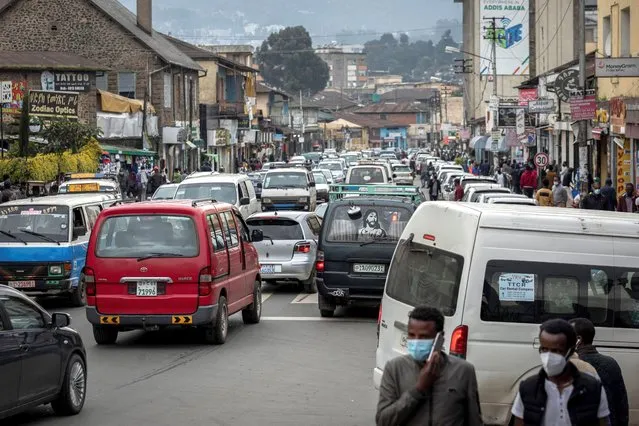
Pedestrians wear face masks to curb the spread of the coronavirus as traffic fills a street in Addis Ababa, Ethiopia Friday, July 17, 2020. (Photo by Mulugeta Ayene/AP Photo)
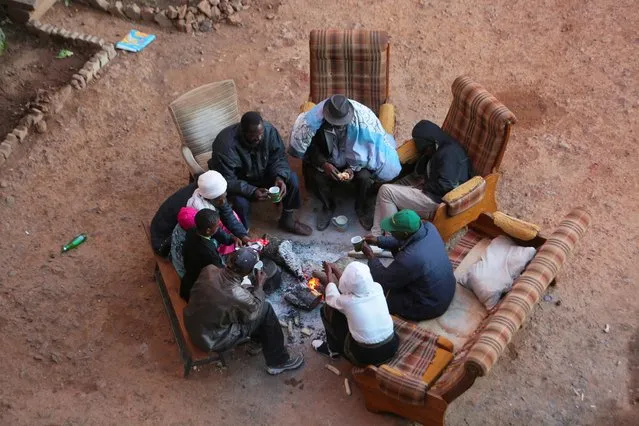
A family gathers a around a fire in a poor neighborhood in Harare, Monday, July 20, 2020. Zimbabwe's finance minister says the country's economy is expected to shrink by 4.5% this year, although others say it will contract even more, as the effects of the coronavirus and a drought take a toll on the struggling southern African nation. (Photo by Tsvangirayi Mukwazhi/AP Photo)
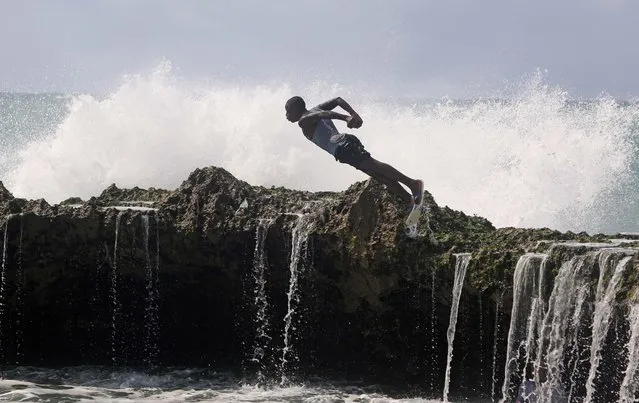
A Somali boy dives from a reef at the Indian Ocean near Hamarweyne beach, amid the potential spread of coronavirus disease (COVID-19), in Mogadishu, Somalia on July 24, 2020. (Photo by Feisal Omar/Reuters)
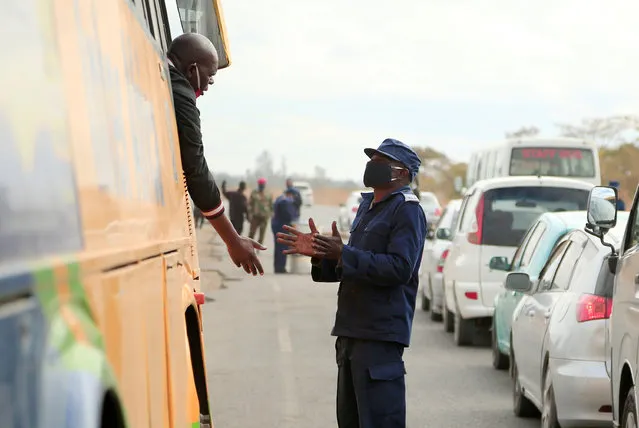
A policeman talks to a bus driver at a roadblock during the coronavirus disease (COVID-19) outbreak in Harare, Zimbabwe, July 24, 2020. (Photo by Philimon Bulawayo/Reuters)
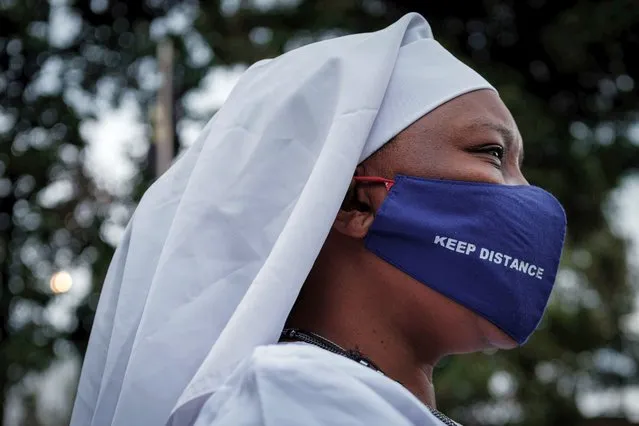
A worshipper of Legio Maria wears a protective face mask with the lettering “Keep distance” as she arrives to attend a prayer at their church in the Kibera slum of Nairobi, on July 26, 2020, after Kenya's President allowed places of worship to reopen under strict guidelines to curb the spread of the novel coronavirus (COVID-19). (Photo by Yasuyoshi Chiba/AFP Photo)
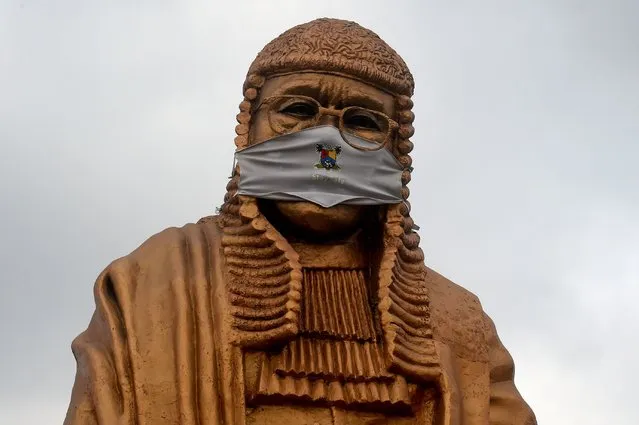
The statue of late lawyer and rights activist Gani Fawehinmi wears a face mask at the Liberty Park at Ojota in Lagos, Nigeria on July 27, 2020. The 34-feet statue to immortalise the fiery lawyer and rights advocate is being used to sensitise people to the sanitary measures taken to curb the spread of the COVID-19 pandemic in Lagos, Nigeria's commercial hub and epicentre of the virus in the country. (Photo by Pius Utomi Ekpei/AFP Photo)
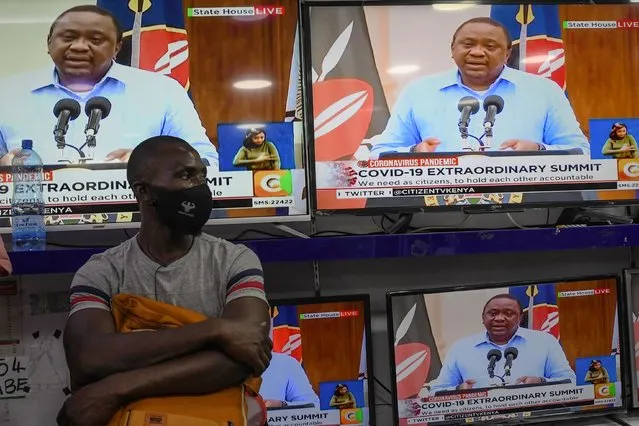
A man wearing a face mask stands inside an electronics shop as Kenya's President Uhuru Kenyatta is seen on television screens while giving an address to the nation on the COVID-19 (novel coronavirus) pandemic, and measures that the government maintain and enforce to curb the disease's spread, on July 27, 2020, in Nairobi. - Kenyan President Uhuru Kenyatta on July 27, banned the sale of alcohol in eateries and restaurants and extended a curfew in a bid to halt a steep rise in coronavirus infections. Kenyatta delivered a stern dressing down to Kenyans for “reckless” behaviour that has seen cases triple in the past month to 17,975, while 285 have died. (Photo by Simon Maina/AFP Photo)
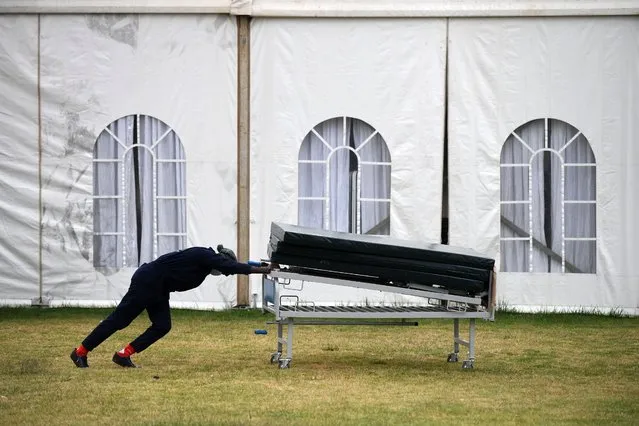
A support staff member pushes newly arrived beds and mattresses at the Kenyatta stadium where screening booths and an isolation field hospital are installed to aid with COVID-19 (novel coronavirus) patients in Machakos, on July 28, 2020. The Kenyan president on July 27, 2020, banned the sale of alcohol in restaurants after noting an “aggressive surge” in COVID-19 cases among young people who were socialising “particularly in environments serving alcohol”. (Photo by Simon Maina/AFP Photo)
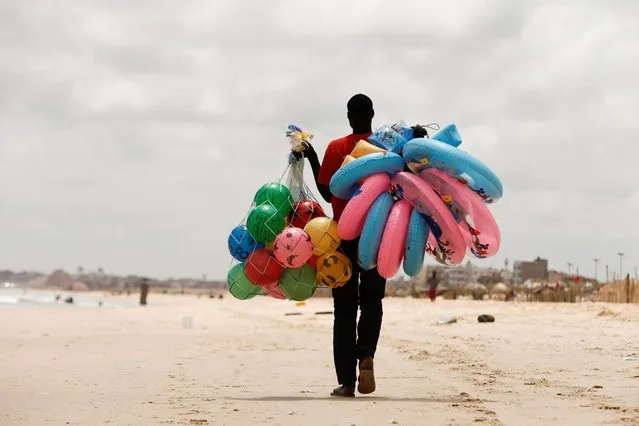
A man carries balloons and life buoys for sale on the Yoff beach, amid the outbreak of the coronavirus disease (COVID-19), in Dakar, Senegal on July 28, 2020. (Photo by Zohra Bensemra/Reuters)
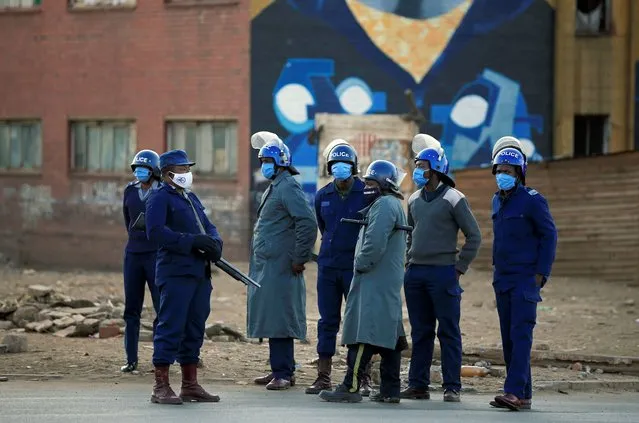
Police officers patrol the street ahead of planned anti-government protests during the coronavirus disease (COVID-19) outbreak in Harare, Zimbabwe, July 31, 2020. (Photo by Philimon Bulawayo/Reuters)
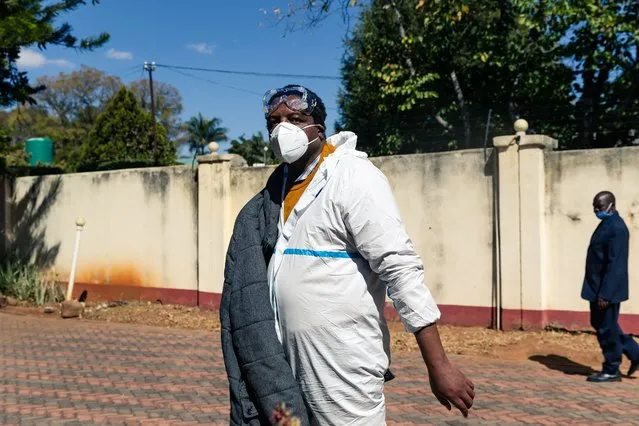
Zimbabwean journalist and documentary filmmaker Hopewell Chin'ono arrives at his home in police custody as police conduct a search of his offices in Harare on July 21, 2020, a day after he was arrested and charged with incitement to commit public violence. Chin'ono and opposition politician Jacob Ngarivhume were the latest among several of President Emmerson Mnangagwa's critics to be arrested or have their homes raided and searched ahead of protests planned for July 31, 2020, with the aim to denounce state corruption. (Photo by Jekesai Njikizana/AFP Photo)
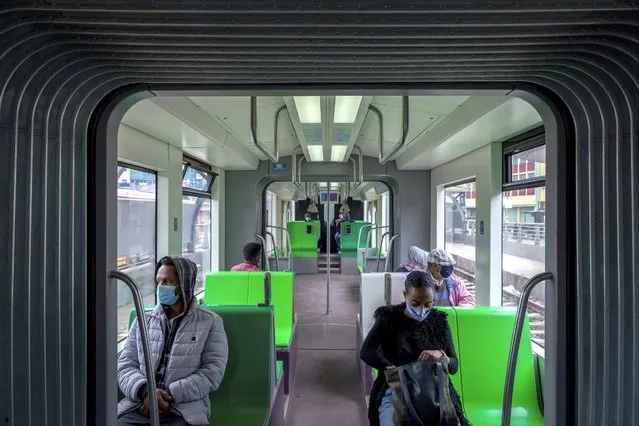
Ethiopians social distance and wear masks to curb the spread of the coronavirus as they ride on the electrified Addis Ababa Light Rail transport system, in the capital Addis Ababa, Ethiopia Thursday, July 23, 2020. Ethiopia's prime minister on Wednesday hailed the first filling of a massive hydroelectric dam that has led to tensions with Egypt, saying two turbines will begin generating electric power next year. (Photo by Mulugeta Ayene/AP Photo)
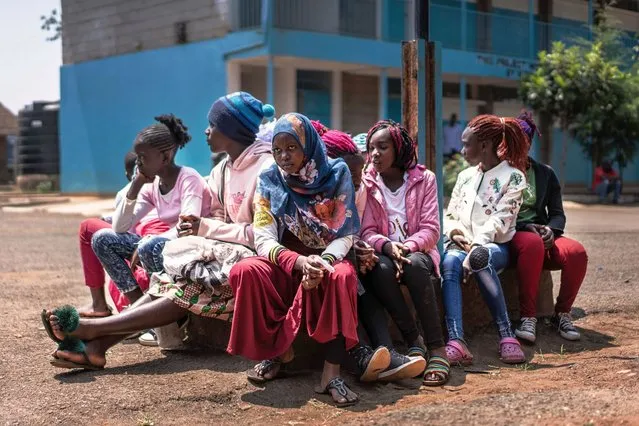
Girls wait to receive distributed sanitary pads at Kibera primary school in the Kibera slum, in Nairobi on July 23, 2020. Kirta Touch The Needy, a local NGO based in Kibera, distributes 20,000 sanitary pads across Kibera slums as girls cannot get sanitary pads at schools, usually provided for free by the government, since all schools are currently closed until next January due to the COVID-19. (Photo by Fredrik Lerneryd/AFP Photo)
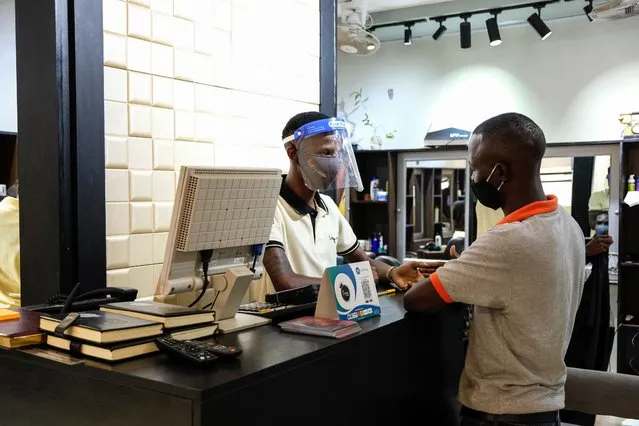
A receptionist wearing a face shield receives a client at a reopened salon shop in Kampala, Uganda, on July 23, 2020. (Photo by Hajarah Nalwadda/Xinhua News Agency)
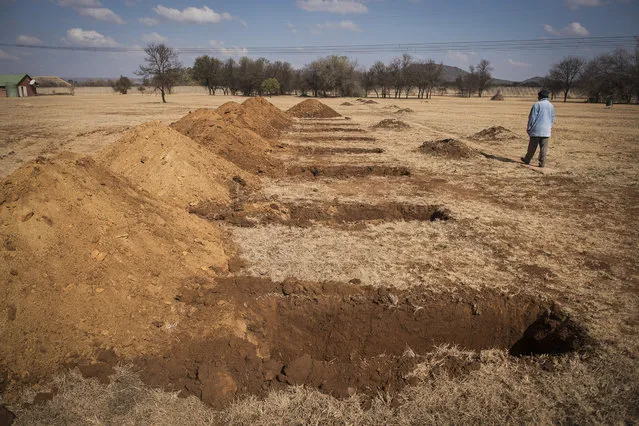
A worker walks past a freshly-dug graves at the Honingnestkrans Cemetery, North of Pretoria, South Africa, Thursday, July 9, 2020. The Africa Centers for Disease Control and Prevention says the coronavirus pandemic on the continent is reaching “full speed” after cases surpassed a half-million and a South African official said a single province is preparing 1.5 million grave. (Photo by Shiraaz Mohamed/AP Photo)
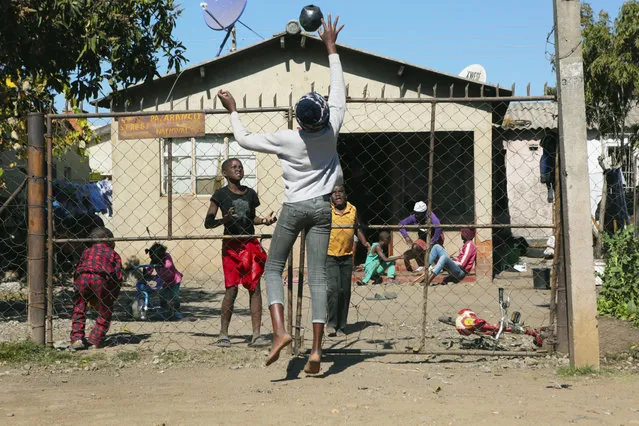
Children play with a ball outside a house, in Harare, Friday, July, 31, 2020. (Photo by Tsvangirayi Mukwazhi/AP Photo)
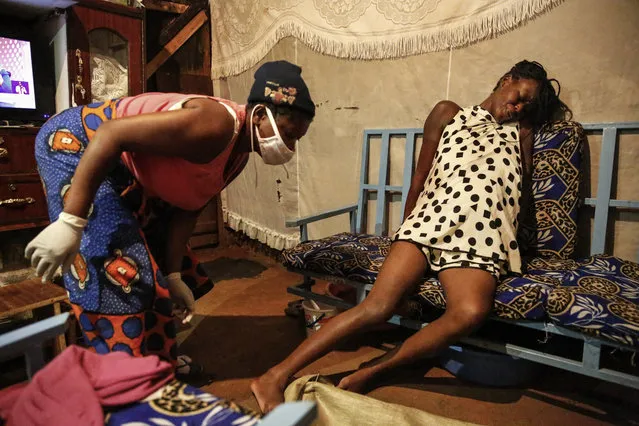
Traditional birth attendant Emily Owino, left, prepares to help Veronica Atieno, right, deliver her baby in Emily's one-room house during a dusk-to-dawn curfew, late at night in the Kibera slum of Nairobi, Kenya Thursday, May 28, 2020. Kenya already had one of the worst maternal mortality rates in the world, and though data are not yet available on the effects of the curfew aimed at curbing the spread of the coronavirus, experts believe the number of women and babies who die in childbirth has increased significantly since it was imposed mid-March. (Photo by Brian Inganga/AP Photo)
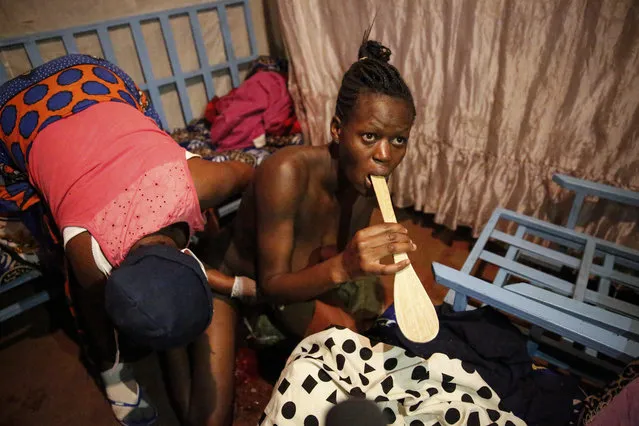
Veronica Atieno, center, bites down on a wooden cooking spoon as traditional birth attendant Emily Owino, left, assists her before delivering her baby in Emily's one-room house during a dusk-to-dawn curfew, in the Kibera slum of Nairobi, Kenya in the early hours of Friday, May 29, 2020. (Photo by Brian Inganga/AP Photo)
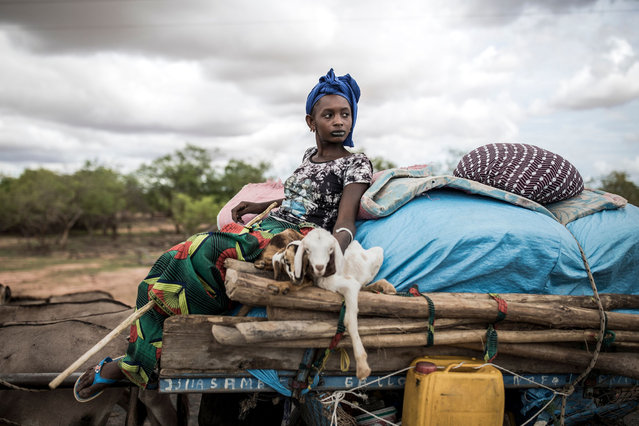
A Fulani Pastoralist carries two baby sheep on her donkey cart as her family move on northwards in Barkedji, Senegal on July 21, 2020. Thousands of Pastoralist families will start the movement north in the next weeks. With the first rains comes fresh grass and water for the Fulani herders' livestock, it also marks the point where most of the Pastoralist will move northwards until the dry season. (Photo by John Wessels/AFP Photo)
04 Aug 2020 00:05:00,
post received
0 comments
